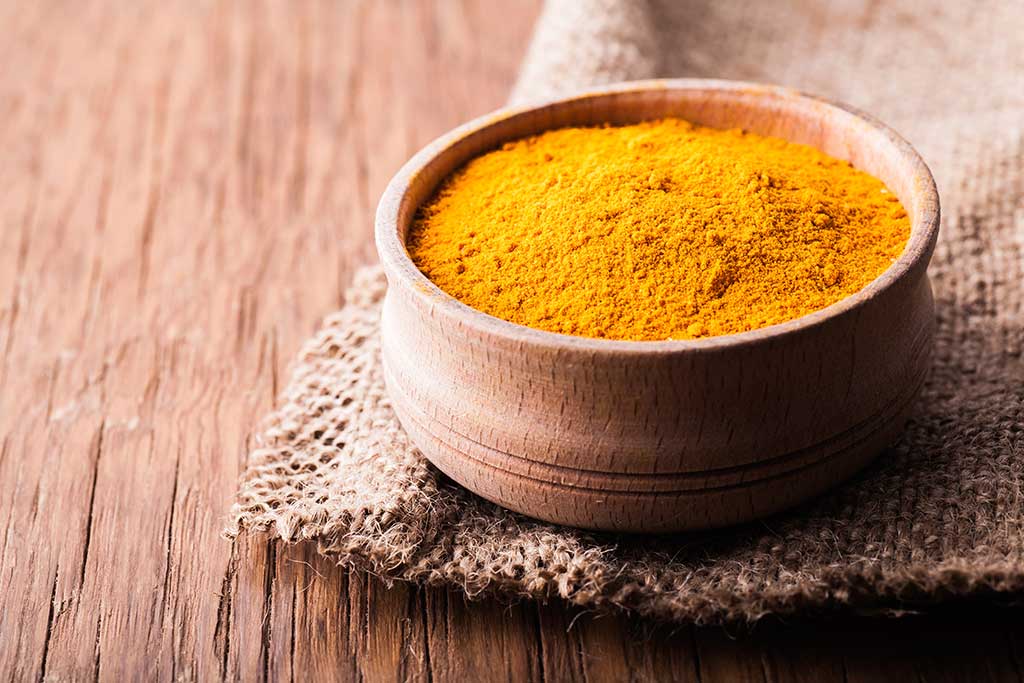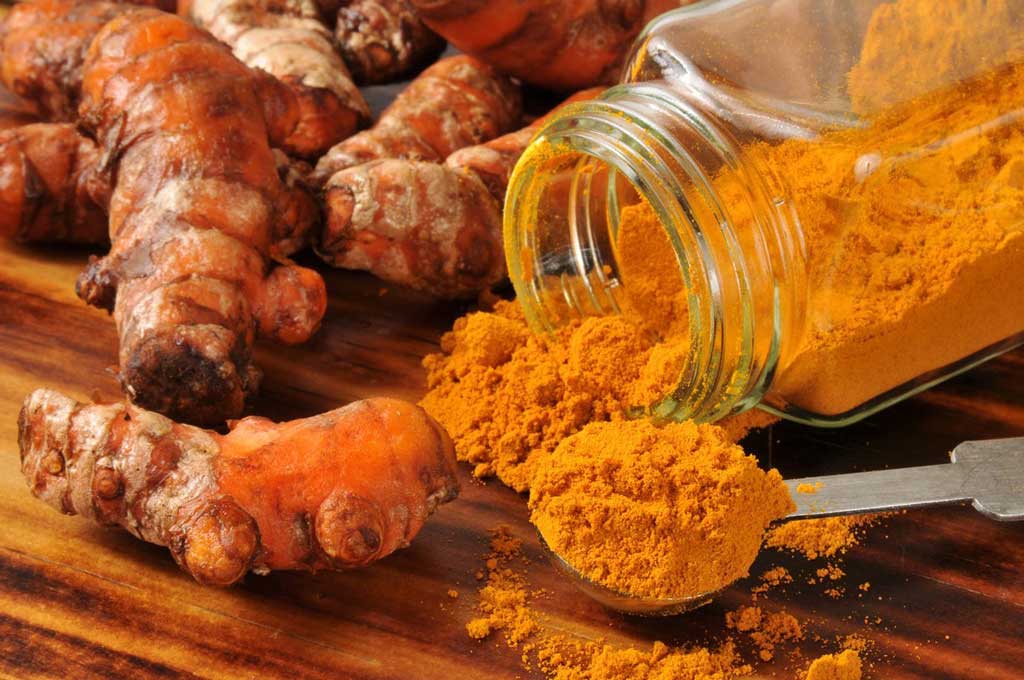Turmeric (Curcuma longa) is an Asian spice derived from the rhizome (underground stem) of the Curcuma longa plant. This plant is native to the southern and southeast parts of tropical Asia. The golden-coloured powder is commonly used in India as a textile dye, for preservation and flavouring of food and for cosmetic purposes. It is admired for its various health benefits and it is traditionally used for rhinitis, wounds, deworming, disorders of the gastro-intestinal system and to relieve the symptoms of rheumatic disorders. Turmeric has many constituents of which one in particular stands out, namely curcumin. Much research has been done on curcumin that is believed to be responsible for most of the health benefits of Turmeric. Curcumin is the substance that gives turmeric its yellowish, golden glow. It was isolated for the first time in the 1800’s, but in Asia this age old remedy has been used for its health benefits for centuries. [1][2][3]
Health benefits of Turmeric
Turmeric is an exceptional spice with a variety of health benefits. It is widely explored for its anti-inflammatory and anti-oxidant potentials. Further-more it possess anti-microbial actions and it can be a useful substance for detoxifying, wound healing, memory enhancement and regulating blood fat and sugar levels. Much research is currently being conducted to improve our understanding of the exact mechanisms through which curcumin is valuable to our health.

Two in one
Turmeric is famous for being an anti-inflammatory agent and an anti-oxidant and therefore Turmeric and curcumin may both be useful in the management of chronic conditions like inflammatory lung diseases, inflammatory bowel diseases and neurodegenerative diseases. Additionally liver damage may be limited and even prevented by taking curcumin supplements and the recovery time of injured muscles may be reduced. It is also argued that turmeric may be beneficial for heart health as it is believed to have properties that may prevent and combat atherosclerosis. [2][3][4][5]
Other benefits of turmeric
Turmeric as a detoxifier
When harmful environmental toxins build up in the body they become dangerous to our health. The body fights this build-up through the actions of certain enzymes. It is thought that Turmeric enhances these enzymes and that it may even block the build-up of harmful substances in the body. [2]
Anti-microbial actions of Turmeric
Curcumin may aid the immune system by regulating the activation of white blood cells which are responsible for fighting and killing micro-organisms that invade the body. This means that curcumin can possibly be used in the treatment of infectious diseases in the future. [5]

Turmeric and wounds
Turmeric is known to have “free radical scavenging” properties and therefore it has been proposed that the topical use of curcumin could be a considerable addition to available treatments of wounds. [6]
Turmeric and memory
Because of the anti-oxidant and anti-inflammatory properties of curcuminoids, turmeric may possibly be effective in the management of neurodegenerative diseases and memory impairment. Something to remember! [7]
Effects of Turmeric on cholesterol and blood sugar levels
It has been suggested that Turmeric may play a beneficial role in reducing levels of harmful cholesterol and that it may also lower excessive blood sugar levels. [2]
It is highly advisable to use turmeric supplements as they are well-tolerated and may have astonishing effects on your body. Turmeric may just be what you need to “spice up” your health.

A synergistic combination - Turmeric and Black pepper
Turmeric and black pepper are both commonly used spices that possess health benefits. Turmeric is popular for its anti-inflammatory and anti-oxidant characteristics and black pepper may enhance the effects of turmeric. Despite the fact that curcumin is tolerated well and has many benefits for health, its bioavailability may not be adequate for performing its functions to the fullest, which may restrict its usefulness. It is now believed that black pepper boosts the serum concentration, absorption and bioavailability of curcumin. This makes for an effective combination. [3][8]
Endless possibilities
Turmeric is certainly a precious commodity and should be held in high regard for its value. It has shown much potential in numerous research trials and much is yet to be discovered about the “gold mine” that is Turmeric.
- Aggarwal BB, Sundaram C, Malani N, Ichikawa H. Curcumin: the Indian solid gold. Adv Exp Med Biol. 2007; 595: 1-75.
- Krishnaswamy K. Traditional Indian spices and their health significance. Asia Pac J Clin Nutr. 2008; 17(1): 265-8.
- Zhou H, Beevers CS, Huang S. Targets of curcumin. Curr Drug Targets. March 2011; 12(3): 332–347.
- Funk JL, Frye JB, Oyarzo JN, Kuscuoglu N, Wilson J, McCaffrey G, et al. Efficacy and mechanism of action of turmeric supplements in the treatment of experimental arthritis. Arthritis Rheum. November 2006; 54(11): 3452-64.
- Jagetia GC, Aggarwal BB. "Spicing up" of the immune system by curcumin. J Clin Immunol. January 2007; 27(1): 19-35.
- Durgaprasad S, Reetesh R, Hareesh K, Rajput R. Effect of a topical curcumin preparation (BIOCURCUMAX) on burn wound healing in rats. JPBMS, 2011; 08(23).
- Kim DS, Kim JY, Han Y. Curcuminoids in neurodegenerative diseases. Recent Pat CNS Drug Discov. December 2012; 7(3):184-204.
- Shobha G, Joy D, Joseph T, Majeed M, Rajendran R, Srinivas PS. Influence of piperine on the pharmacokinetics of curcumin in animals and human volunteers. Planta Med. May 1998; vol. 64(4): 353-6.

